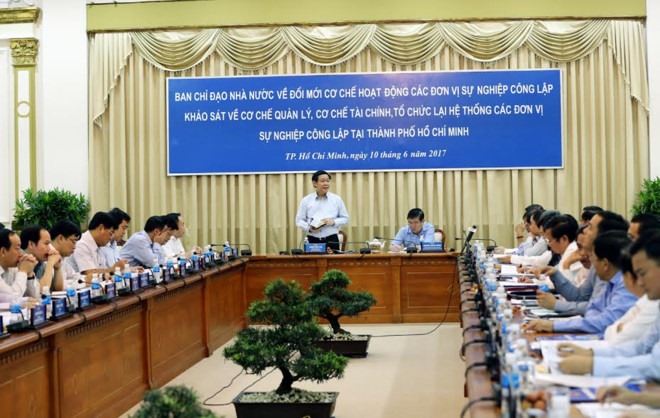 Society
Society

Deputy Prime Minister Vương Đình Huệ, who is also the head of the State Steering Committee on Renovating Public Administrative Units, paid a working visit to HCM City on Saturday to review the management and financial mechanisms of government offices and their reorganisation.
 |
| Deputy Prime Minister Vương Đình Huệ, who is also the head of the State Steering Committee on Renovating Public Administrative Units, paid a working visit to HCM City on Saturday to review the management and financial mechanisms of government offices and their reorganisation. — Photo zing.vn |
HCM CITY – Deputy Prime Minister Vương Đình Huệ, who is also the head of the State Steering Committee on Renovating Public Administrative Units, paid a working visit to HCM City on Saturday to review the management and financial mechanisms of government offices and their reorganisation.
“The achievements of HCM City, the biggest economic hub, will have great significance on the policy to renovate public administrative units,” he told city leaders at a meeting.
“It will help the Steering Committee adopt new solutions to step up renovation of public administrative units.”
He called on the city to assess its capability to provide public services, consider measures to prune the government payroll and cut recurring expenses, and find new models for effective spending through bidding, efficient public services and management of government offices.
Deputy chairman of the city People’s Committee, Lê Thanh Liêm, reported that in the last five years the numbers of both public administrative units and government workers have increased from 1,765 to 1,871 units and from 107,188 to 118,609.
“It is because of the rapid increase in population. HCM City has to expand schools, build new hospitals, and establish new public administrative units.”
However, the city’s recurring expenses are expected to drop from 53 per cent of total expenditure last year to 48 per cent this year.
“By the end of next year 55 hospitals and 50 per cent of administrative units can earn enough money themselves for regular expenditure,” Phan Thị Thanh, director of the city’s finance department, said.
“Public schools account for 76 per cent of all schools but only 0.7 per cent of them can manage their recurring expenses.”
In the upcoming school year more 60,000 children are expected to attend first grade.
However, the private services sector has developed strongly, met many social needs and created jobs, helping ease pressure on public units.
The chairman of the city People’s Committee, Nguyễn Thành Phong, said there is already a programme to promote private investment in healthcare and education.
HCM City has been the first to pilot a public-private partnership model at the level of ward healthcare centres.
Private companies have installed machines at a healthcare centre in District 3’s Ward 11.
“We do not separate the public and private segments but support each other,” the head of the healthcare centre told the deputy PM.
“The profits from medical services are reinvested in the centre.”
Huệ appreciated the model, saying it would benefit society. He stressed that local authorities should not discriminate between public and private agencies and said there should be transparency in public – private partnerships.
He called on the city to list the government agencies that require 100 per cent financial support from the Government and those that do not require any support. — VNS